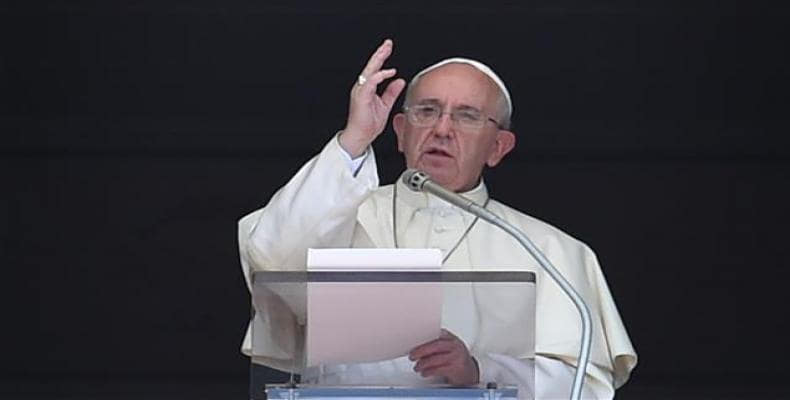“No one can accept the precepts of neoliberalism and consider themselves Christian,” pope Francis wrote in his days as Cardinal Jorge Bergoglio, archbishop of Buenos Aires. As pope, he puts the matter more directly: “Such an economy kills.” He regards the environmental crisis as an economic-justice crisis as well: “The same mind-set which stands in the way of making radical decisions to reverse the trend of global warming also stands in the way of achieving the goal of eliminating poverty.”
This pope, like millions of Catholics, comes from the southern side of the equator, and it was there that he learned how the global economy works. In Argentina, even while in high office, he made it a habit to hear confessions in impoverished districts. “He’s a person who comes from walking through the poor neighborhoods, from walking with those who are in very bad condition,” says Néstor Escudero, a member of the Argentine NGO La Alameda, which opposes human trafficking and organizes cooperatives among victims. Cardinal Bergoglio lent his presence and protection to La Alameda, along with other groups that faced danger because of their work.
Some of the most emphatic speeches of Francis’s papacy have come at gatherings of social movements, including one in Rome in 2014 and another this year in Bolivia. “You, the lowly, the exploited, the poor and underprivileged, can do, and are doing, a lot. I would even say that the future of humanity is in great measure in your own hands, through your ability to organize and carry out creative alternatives,” he told his listeners in Bolivia. “I want to unite my voice with yours in this fight,” he said in Rome. The early symbolic acts of his papacy —adopting simple vestments and apartments, washing the feet of a Muslim girl in juvenile detention— reflect a formidable populism.
Naomi Klein, the Canadian journalist, returned from a summit of climate activists over the summer impressed by how Vatican higher-ups seemed to be listening more than speaking. “They’re showing us what rapid institutional change looks like,” she said. When it comes to putting economic justice at the center of environmental ethics, she adds. North American environmental organizations have a lot to learn from this pope.
So does the pope’s assault on the economic order represent continuity, or an actual break? Has the content of faith changed, or just its emphases? And how much can (or will) Francis really do? These are ever-recurring questions.
Having a pope means holding a posture of receptivity toward him —and yet the meek, not the powerful, will inherit the earth, and the poor will rule the coming kingdom. Preserved in the world’s most conservative institution is a body of radical notions about economic life.
Pope Francis isn’t coming out of nowhere with his “small is beautiful” form of ecological economics. He calls for urgency in confronting the climate crisis, while declining to put his trust in modern technology and markets for the solution. His sources of inspiration are the remaining vestiges of indigenous agriculture, cooperative business models, and a call for the mass rejection of consumerism.
Francis speaks from a tradition that goes back to the Catholic Church’s ban on usury, or predatory lending, which has been all but forgotten today. Early theologians insisted that the common good trumps any privilege of private property. For all the Vatican’s authority over the church Catholic social teaching proclaims the concept of subsidiarity, meaning that economic and political power should remain as local and as participatory as possible. The basic sites of production should be the household and the community, not some faraway, intrinsically usurious corporation.
Pope Francis credits his father, an overworked accountant, with imparting to him “a great allergy to economic things.” But from the same source he also remembers hearing, as a teenager, about the virtues of cooperativism: “It goes forward slowly,” his father said, “but it is sure.” In an address to members of Italian cooperatives last February, Francis championed what he called “an authentic, true cooperative…where capital does not have command over men, but men over capital.”
Cooperativism is neither capitalist nor communist, and the same is true of Francis. He’s a leader formed in the skirmishes between the First and Second worlds —accepting neither, and turning to Catholic tradition for older and wiser alternatives to them both.
And as such Pope Francis poses no small danger to the so neoliberal American dream.


